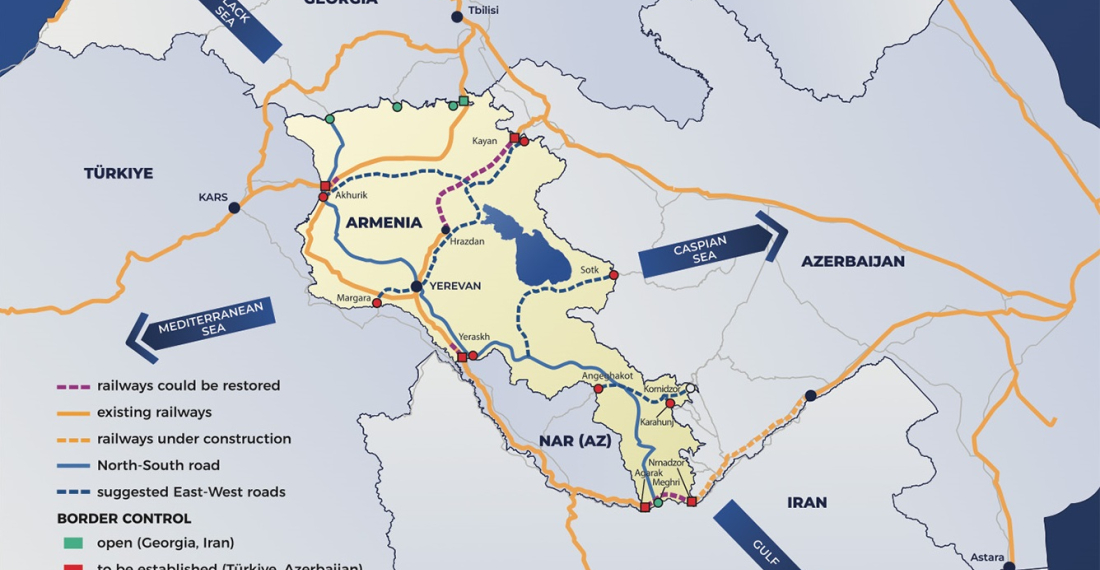Armenian Prime Minister Nikol Pashinyan recently presented the "Crossroads of Peace" initiative at the Tbilisi Silk Road Forum held at the end of October. Alongside other regional figures like Georgia's Prime Minister Irakli Garibashvili and Azerbaijan's Prime Minister Ali Asadov, Pashinyan outlined his vision for regional collaboration.
Pashinyan's map depicts rehabilitated existing roads and logistical connections, adding new pathways. His message was clear: envisioning a post-conflict era for Azerbaijan and Armenia, and at the same time reaching out to Turkey. The map symbolized the potential regional landscape after the conflict, and was aimed at both the Armenian public and external actors.
To the Armenian people, Pashinyan tried to sell the idea of connectivity and regional cooperation as a pathway to economic prosperity. Simultaneously, he extended an olive branch to the international community, signaling Armenia's readiness for substantial peace talks with a robust strategy for both Azerbaijani-Armenian relations and domestic stability.
Pashinyan's political track record, marked by upheavals, adds an element of unpredictability to the mix. Despite this, he used the Silk Road Forum platform to showcase his diplomatic prowess and vision, emphasizing the necessity of dealing with neighbors, specifically Azerbaijan and Turkey.
While there were inklings of engagement with Iran and Georgia, the heart of the presentation focused on communication and connectivity with Azerbaijan and Turkey. Without their involvement, the map loses its value.
The idea itself looks attractive, however for the plan to materialize into negotiations, Pashinyan would need to offer something more substantial to Azerbaijan and Turkey – something that they genuinely need. While the offer of peace is undoubtedly appealing, it is not quite enough in the present conditions. At present, neither Azerbaijan nor Turkey views Armenia as a military threat or rival. Thus, Pashinyan's plan lacks the necessary leverage.
The follow-up to the presentation, or basically the fact that Azerbaijani side did not really give any meaningful reply to Mr. Pashinyan, shows that, Armenia did not put enough on the table; and that for Azerbaijan Armenia's offer is insufficient. The plan, which appears more advantageous for Armenia than Azerbaijan, doesn't create a balanced quid pro quo scenario. In the plan that was offered by Mr. Pashinyan, there is a lot for Armenia, and much less for Azerbaijan.
The discussion about connectivity cannot be separated from domestic considerations. In the case of Azerbaijan this is related to its ambition, to establish convenient and safe transit for Azerbaijani residents of Nakhchivan, from and to the Nakhchivan exclave. There are many exclaves in this world, but Nakhchivan is one of the largest one. It also suffers from not having access to the sea, and has a substantial population of around half a million people.
Azerbaijan's ambition, as outlined in the 2020 trilateral statement, is to establish unimpeded travel for Azerbaijanis between the mainland and Nakhchivan.
The second facet involves the advantages Azerbaijan would gain from open trade and transport between its western regions and the Nakhchivan-Armenia border. Pashinyan proposed five border crossings, offering a tactical advantage for cross-border trade and economic cooperation. However, the intricacies of the Russian-led customs union of which Armenia is a member, and the small size of the Armenian economy, does not help much in this opening.
At the regional level, the Zangezur corridor is the prominent issue. Azerbaijan's transit aspirations hinge on this corridor, which will give it a significant improvement in its transit position. Azerbaijan, emerging as a transit country, faces challenges, because at the moment the main transit routes for Azerbaijan is the Georgian one, particularly its Black Sea ports corridor, and unfortunately, Georgian ports have certain capacity limitations. The recent decrease in railway transit between Georgia and Azerbaijan underscores these challenges.
The revival of discussions between Azerbaijan and Armenia on the transit regime is crucial for both tactical and regional dynamics. Currently, the corridor between Georgia and Azerbaijan operates under monopolistic conditions. Introducing an alternative becomes strategic, offering leverage in the negotiation process.
In essence, Pashinyan's "Crossroads of Peace" map presents a compelling pitch. The Azerbaijani statement about finding an alternative to Zangezur through Iran underscores the corridor's significance. Even statements of waning interest in the Zangezur corridor do not diminish its importance. If Armenia proposes a meaningful transit arrangement for Azerbaijani transits through its territory, Azerbaijan's interest in the corridor is likely to reignite.
source: Ramazan Samadov is a professional with over a decade of experience in the banking sector. In addition to his extensive background in the private industry, he has spent nine years dedicated to delivering strategic consulting services in Brussels. Ramazan Samadov is also a member of the Joint Liaison Group on Confidence-building measures in support of lasting peace in the South Caucasus (JOLIG).
photo: Map with a vision of South Caucasus transport links presented as part of the "Crossroads of peace" initiative by Armenian prime minister Nikol Pashinyan in Tbilisi in October 2023 (picture courtesy of the press ervice of the prime minister of Armenia)
The views expressed in opinion pieces and commentaries do not necessarily reflect the position of commonspace.eu or its partners






